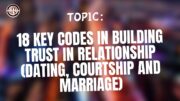When it comes to relationships, there are certain boundaries and behaviors that should never be crossed. Here are 10 things your spouse should never do that are seriously messed up:
- Physical abuse
- Emotional manipulation
- Cheating
- Verbal or psychological abuse
- Financial deception
- Substance abuse
- Lack of support
- Neglect or indifference
- Control and isolation
- Gaslighting
Seriously messed-up things your spouse should never do:
Physical abuse:
Physical abuse involves any form of violence or harm inflicted on a person by their spouse. This can range from hitting, slapping, pushing, or any other form of physical aggression. Physical abuse is not only illegal but also a clear sign of an unhealthy and dangerous relationship. It can cause physical injuries, emotional trauma, and long-lasting psychological effects.
Emotional manipulation:
Emotional manipulation involves tactics such as guilt trips, playing mind games, or using emotional blackmail to control or manipulate the other person. It can include gaslighting (making the victim doubt their own perceptions or memories), constant criticism, or withholding affection as a means of control. Emotional manipulation erodes trust, distorts reality, and can have a significant impact on the victim’s self-esteem and mental well-being.
Cheating:
Cheating refers to engaging in sexual or emotional relationships outside of the committed partnership. Infidelity is a breach of trust and can cause immense pain and emotional distress. It undermines the foundation of a relationship and often points to deeper issues that need to be addressed. Rebuilding trust after infidelity can be a long and challenging process.
Verbal or psychological abuse:
Verbal or psychological abuse involves the use of words, tone, or gestures to demean, belittle, insult, or intimidate a spouse. It can include constant criticism, humiliation, name-calling, or making threats. Verbal and psychological abuse can cause severe emotional and psychological harm, leading to feelings of worthlessness, anxiety, and depression.
Financial deception:
Financial deception occurs when a spouse hides financial information, lies about money matters, or uses finances as a means of control. This can include secret bank accounts, undisclosed debts, or restricting access to money. Financial deception erodes trust, hampers financial stability, and creates an imbalance of power within the relationship.
Substance abuse:
If a partner begins abusing substances, such as alcohol or drugs, and refuses to get assistance or put the relationship’s health first, it can have devastating consequences. Substance abuse can lead to erratic behavior, emotional instability, financial strain, and a breakdown of trust and communication within the marriage.
Lack of support:
In a healthy marriage, both partners should support and encourage each other’s personal growth, dreams, and aspirations. When a spouse consistently undermines or dismisses their partner’s goals and ambitions, it can lead to feelings of resentment, low self-esteem, and a lack of fulfillment. Healthy relationships thrive on mutual support and encouragement.
Neglect or indifference:
Emotional connection and intimacy are essential aspects of a marriage. When a spouse consistently neglects their partner’s emotional needs, withdraws affection, or displays a general lack of interest in their well-being, it can be incredibly hurtful and damaging. Emotional neglect can lead to feelings of loneliness, frustration, and a breakdown of the emotional bond between spouses.
Control and isolation:
Exerting control over a spouse’s actions, limiting their freedom, or isolating them from friends and family is a form of abuse. Controlling behaviors can include monitoring their whereabouts, restricting their social interactions, or making decisions without their input. Isolation and control erode a person’s autonomy, self-esteem, and support network, leaving them vulnerable and dependent on their spouse.
Gaslighting:
Gaslighting is a manipulative tactic used by a spouse to distort their partner’s perception of reality. It involves denying or trivializing their experiences, making them doubt their memory, perception, or sanity. Gaslighting undermines a person’s confidence and sense of reality, leaving them confused, anxious, and questioning their own sanity. It is a deeply harmful form of psychological abuse.
Conclusion
In conclusion, there are several seriously messed-up things that your spouse should never do within a marriage or committed relationship. These actions include physical abuse, emotional manipulation, cheating, verbal or psychological abuse, financial deception, substance abuse, lack of support, neglect or indifference, control and isolation, and gaslighting.
Engaging in any of these behaviors creates an unhealthy and toxic environment within the relationship, causing significant harm to the victim’s physical and emotional well-being. It is crucial to recognize these actions as unacceptable and take steps to prioritize your own safety, well-being, and happiness.
If you find yourself experiencing any of these behaviors within your marriage, it is essential to seek support and assistance. Reach out to trusted friends, family, or professionals such as therapists or counselors who can provide guidance and help you navigate through these challenging circumstances.
Remember, a healthy and fulfilling relationship is built on trust, respect, open communication, and mutual support. You deserve to be in a relationship where you are valued, respected, and treated with love and kindness.



Be the first to comment on "10 Things Your Spouse Should Never Do That Are Seriously Messed Up"